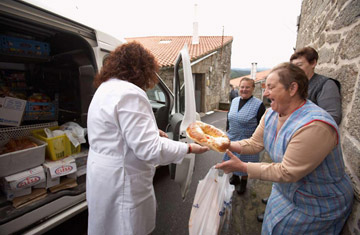
BREAKING BREAD: Buying freshly baked breads from the Pan de Cerdedo bakery truck. Every home in Vilar has its own bread oven now only used for storage.
(3 of 3)
Vilar is already getting a trickle of new blood. My favorite house is a beautiful renovation belonging to "the professors," Galician labor historian and sociologist Dionisio Pereira and his wife Lola. They are back-to-the-land intellectuals who chose Vilar for its rural authenticity. They work the land with antiquated tools and cook in clay cazuelas, although the modern-day authentic peasants are all using metal pots and putting in linoleum. Although the professors are respected, their neighbors can't imagine why rich, educated people would live like that.
A few years ago, a couple referred to as "the Belgians" (although he was from Barcelona) turned a farmhouse into a trophy mansion complete with an electronic gate, a disco, and a trout pool not much bigger than a bathtub, where the husband would fish for dinner. They sold it to "the Madrileños" (it's anyone's guess where they're really from), who have filled it with parrots. The villagers consider it a showplace. However, in nearby Loureiro, local activists want "ethnographic" development. Rural authenticity is disappearing and being replaced by folk festivals. In light of the demographic crisis, Cerdedo's mayor is trying to move the economy to the industrial or service sectors and promote the town's potential for adventure and cultural tourism. Rosamari's daughter Ester Pereira, 25, works at his bar-restaurant O Comareiro, while her brother Angel, 20, found a job in a nearby glass factory. For the moment, Vilar's last two young workers have no plans to leave.
Part of the mayor's economic plan involves staging gastronomic events. Our April visit coincides with the second annual Cerdedo Wild Boar festival. There's also the February Vincha Festival, now in its seventh year of celebrating bread pudding steamed in a pig's bladder. Both dishes have long local traditions, but the idea of marketing them to visitors is very new. It's ironic that as these foods are dying out from everyday life, they are being produced for mass consumption as a cultural attraction. Still, the good thing is that you no longer need to be an insider to try what was once strictly family fare.
We find the Cerdedo festival grounds by following the skirl of bagpipes wailing from loudspeakers. Three amateur cooks, led by a local tractor salesman, are stewing 22 boars to feed 5,000. Copper cauldrons are boiling octopus for an outstanding pulpo gallego, spiked with hot paprika and bathed in a stream of sunny olive oil. Stonecutters demonstrate their craft, and equestrians put on a horse show. I almost buy a stone griddle for making filloas, but I know Gloria swears by a nonstick skillet. My touristy romanticism would only mean excess baggage charges.
Inside the exhibition hall, there is a trade show of Cerdedo tastes, old and new. Besides local honey and wild-boar sausages, I find jars of Galician wakame seaweed. The sample of "local Ibérico ham" is neither Ibérico nor local, and Carrefour has a booth. Maybe sushi and strip malls are not so remote after all. Bland commercialization, however, is limited by the fact that this is a small-scale local production, and the taste of tradition here is still lively. The majority of the food was made by local home cooks, so the fair has the feeling of a potluck picnic reunion. Everyone in the surrounding area has shown up. I try the vincha — dense as a cannonball and quite tasty if you can get pig piss off the brain — as well as another local specialty, galiña a la sal, an aged hen that spent a long time developing fat, muscle and flavor before being buried in a pot of coarse salt and baked for three hours. The flesh practically melts off the bones into its own fat, and the skin redefines finger-licking good. Obviously, this recipe is impossible with a factory-farmed supermarket chicken. Recalling Señora Carmen's empty coop, I wonder how many old hens are left around here.
Even in the festival's commercial atmosphere, feasting on wild boar taps deep into the collective consciousness. Wild-boar hunting is dangerous, with hunters at risk of being gored or accidentally shot once the boar is surrounded. Nothing brings life into sharper focus than the imminent prospect of death. Bringing home the kill for the village feast is humanity's most primal cultural gesture, not to mention an effective antidote for middle-class modernity's neurotic inability to look its food in the face. When we sit down at the long communal table and bite into the sweet, untamed wildness, we are all members of the same tribe.